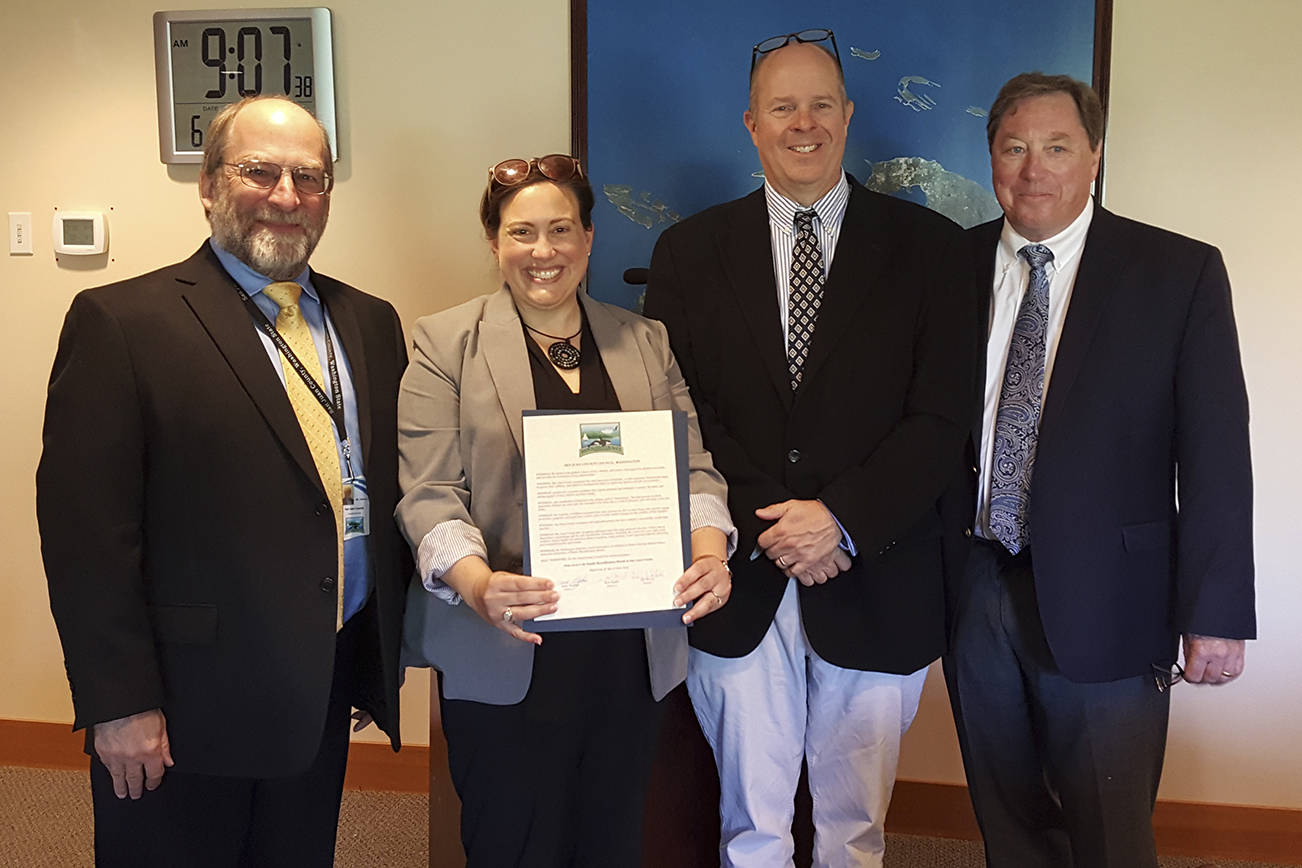More than 6,000 children are removed from their homes each year in Washington state due to abuse and neglect, according to San Juan County Juvenile Court Services Administrator Linnea Anderson.
“We know [the children] don’t hate their families because of those problems, and that they end up hating themselves,” Anderson told San Juan County Council during the proclamation of June as Family Reunification Month on June 4.
The proclamation, written in large part by San Juan County Superior Court Judge Katherine Loring, contains powerful language supporting local families and children, including:
“Family is the primary source of love, identity, self-esteem and support for children and adults, and provides the foundation of our communities.
San Juan County recognizes the vital importance of families as well as parents’ fundamental rights to parent their children, and children’s fundamental rights to nurturing healthy and safe environments…”
The proclamation also thanked the many partners who play critical roles throughout dependency proceedings including court staff, social workers, mental health and substance abuse counselors, foster care parents and the special advocate volunteers.
San Juan County is low on both Court-Appointed Special Advocate volunteers and foster care guardians, Anderson said.
For those interested in fostering, there will be a presentation about the program at 6 p.m. on Thursday, June 13, at the San Juan Island Grange.
“If you are interested, but maybe not quite ready, it’s still a great place to learn about [foster care], as well as learning about supporting foster kids in other ways,” Anderson said.
Approximately half of Washington’s annual 6,000 youths are assigned an advocate. As a result, statistics show, the chances of being reunited with their family, or, when that is not possible, finding a permanent safe and loving home, is much higher. This is because CASA volunteers not only work for the best interest of the child but are often the individual most familiar with the dependency case. Dependence refers to a child who has been taken into state custody. Once a CASA is assigned, they are involved for the entire duration of the case. According to Anderson, dependencies can last from 18 months to two years or more.
“[San Juan County CASA supervisor] Lenore Bayuk once presented a timeline of a particular case to court, so the judge could see everything that had gone on for that child while in dependency, and it was so powerful,” Anderson said.
Judges come and go, she explained, attorneys and social workers shift, but CASA volunteers remain.
Bayuk, who became a CASA in the 1980s, agreed with that sentiment saying “it is the CASA who is the most consistent person working with the child throughout the dependency [case].”
She continued saying that children need as much support and consistency during that traumatic time, being separated from their family, and CASA provides that.
“It is truly work from the heart,” Bayuk said.
The CASA program began in King County, Washington, in 1977, according to Anderson, after a judge became frustrated that children’s best interests were not being heard in court. The Washington State Judges Association created legislation that later became the cornerstone for CASA programs nationwide.
The responsibilities of a volunteer, as listed in an informational packet that will be provided to interested individuals, includes: Investigating the circumstances of the case; interviewing the child, family foster parents, teachers, doctors and other involved individuals.
The responsibilities of an advocate include:
• Serving as a monitor of agencies and ensures the children and families receive the help they need.
• Assuring the child’s wants and needs are heard, and that the best interests of the child are presented to the court.
• Presenting information to the court and recommends a plan that is representative of the child’s best interest. The CASA regularly prepares a written report which becomes a permanent part of the case record.
CASA does not:
• Diagnose when a child has special needs, including medical educational or psychiatric, but does observe behaviors and may make recommendations for actions such as counseling.
• Befriend the child, take them on overnight visits, or provide them a home.
• Arrange for a child’s placement, medical treatment or manage the cast plan for the social worker.
• Supervise visits, but does observe visitation between parent and child.
• File legal documents with the court without the assistance of counsel or a CASA supervisor.
• Contact the judge directly to discuss a case.
Currently, San Juan County has six volunteers, but Anderson estimates she would love to increase that number to 10.
Entering into the world of CASA is a lengthy but straightforward process. First, bring a filled out application to Anderson or Bayuk. An interview with the two of them will be scheduled and a background check will be run. The potential volunteer will also participate in ongoing training. According to Anderson, the average commitment from each CASA volunteer is five to 10 hours a month. It can take six months to a year before a new volunteer receives their first case, she added.
Anderson’s goal is for every child in dependency to be assigned a CASA. San Juan County’s six volunteers have been working multiple cases, which is not ideal, and Anderson is concerned about burn-out. However, she noted, they are an incredible team.
“They work really well together,” Anderson said, adding that their teamwork is vital to ensure the county’s CASA program runs smoothly, and the children’s best interest met.
“It’s one of the most important volunteer jobs anyone can engage in,” Anderson continued. “Every child deserves a safe and permanent home.”




